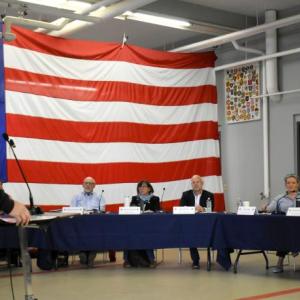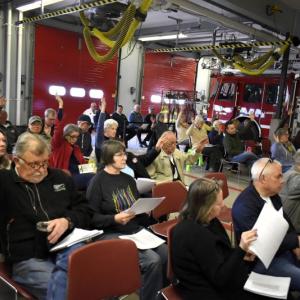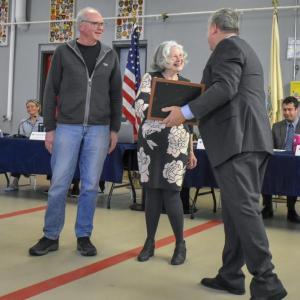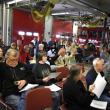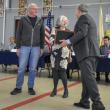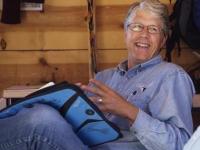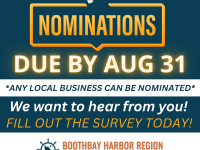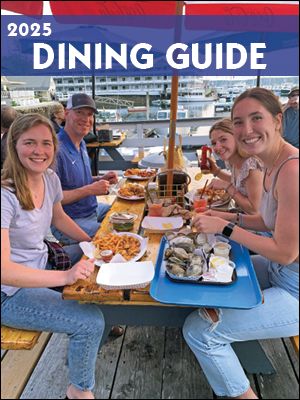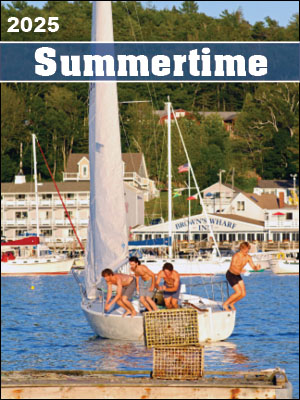Boothbay Harbor voters pass $6.4M budget
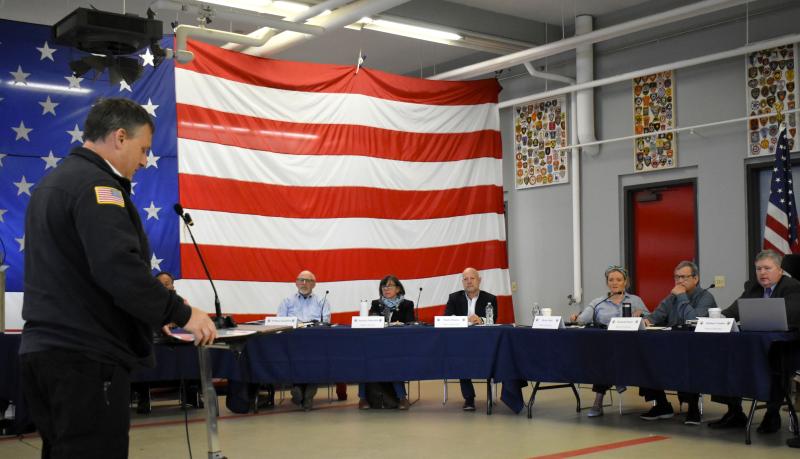 Boothbay Region Ambulance Service President Robert Ham speaks during Boothbay Harbor's annual town meeting May 3. FRITZ FREUDENBERGER
Boothbay Region Ambulance Service President Robert Ham speaks during Boothbay Harbor's annual town meeting May 3. FRITZ FREUDENBERGER
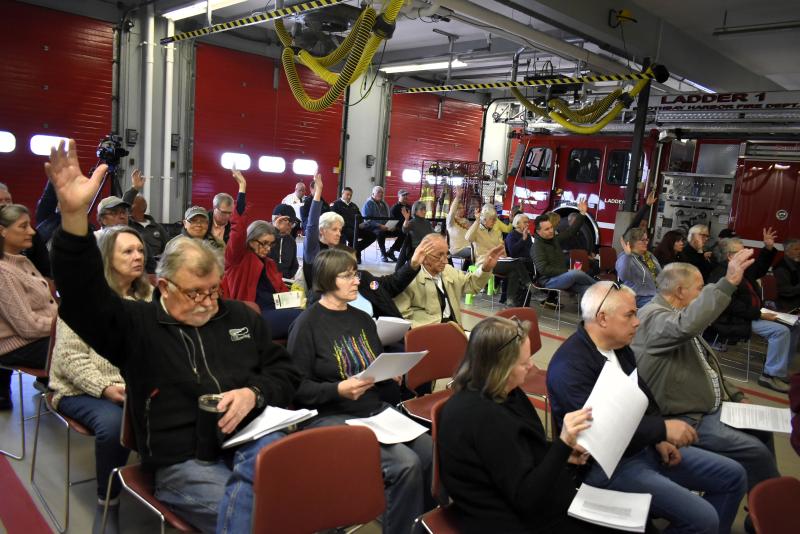 Residents vote at the Boothbay Harbor Town meeting. FRITZ FREUDENBERGER/Boothbay Register
Residents vote at the Boothbay Harbor Town meeting. FRITZ FREUDENBERGER/Boothbay Register
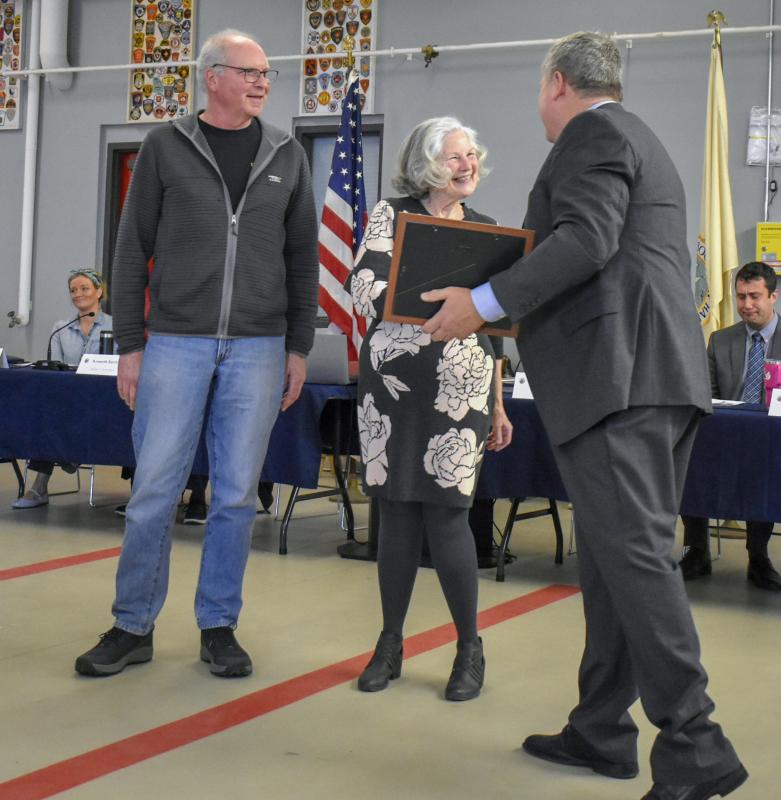 Lynn Thompson and Jeff Long accept the Spirit of America Tribute from Boothbay Harbor on behalf of Harbor Theater. "We're honoring them for their exemplary service in the community for a lasting commitment of dedicated volunteers enriching our cultural, social, and civic life here in Boothbay Harbor," said Selectboard Chair Mike Tomko, right. FRITZ FREUDENBERGER/Boothbay Register
Lynn Thompson and Jeff Long accept the Spirit of America Tribute from Boothbay Harbor on behalf of Harbor Theater. "We're honoring them for their exemplary service in the community for a lasting commitment of dedicated volunteers enriching our cultural, social, and civic life here in Boothbay Harbor," said Selectboard Chair Mike Tomko, right. FRITZ FREUDENBERGER/Boothbay Register
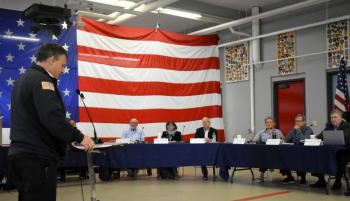 Boothbay Region Ambulance Service President Robert Ham speaks during Boothbay Harbor's annual town meeting May 3. FRITZ FREUDENBERGER
Boothbay Region Ambulance Service President Robert Ham speaks during Boothbay Harbor's annual town meeting May 3. FRITZ FREUDENBERGER
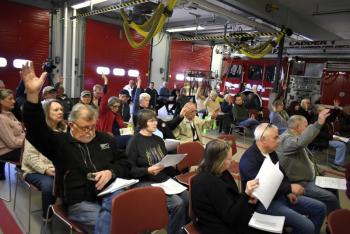 Residents vote at the Boothbay Harbor Town meeting. FRITZ FREUDENBERGER/Boothbay Register
Residents vote at the Boothbay Harbor Town meeting. FRITZ FREUDENBERGER/Boothbay Register
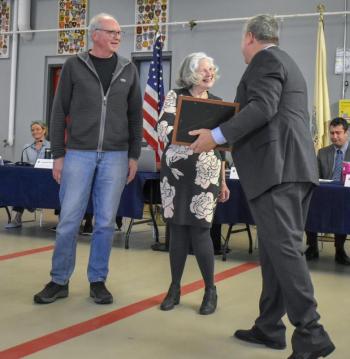 Lynn Thompson and Jeff Long accept the Spirit of America Tribute from Boothbay Harbor on behalf of Harbor Theater. "We're honoring them for their exemplary service in the community for a lasting commitment of dedicated volunteers enriching our cultural, social, and civic life here in Boothbay Harbor," said Selectboard Chair Mike Tomko, right. FRITZ FREUDENBERGER/Boothbay Register
Lynn Thompson and Jeff Long accept the Spirit of America Tribute from Boothbay Harbor on behalf of Harbor Theater. "We're honoring them for their exemplary service in the community for a lasting commitment of dedicated volunteers enriching our cultural, social, and civic life here in Boothbay Harbor," said Selectboard Chair Mike Tomko, right. FRITZ FREUDENBERGER/Boothbay Register
Just over 50 Boothbay Harbor residents attended the annual town meeting May 3 where they approved a $6,404,935 total budget for the 2025-2026 fiscal year. Voters passed all 29 warrant articles, but not without debate. After concerns were raised about the Boothbay Region Ambulance Service (BRAS) budget, voters agreed on a cut to the organization’s support.
Overall, the total budget represents a $371,083 (6.15%) increase from last year’s. From the total budget, the $4,211,352 municipal budget is a $274,133 (6.96%) increase. Outside the municipal budget, voters also approved a combined $2,193,583 for hydrants, sanitation and community support community organizations including BRAS and the library. The amount is a $96,950 (4.62%) increase from the previous year.
However, the vote to approve organizational support became complicated. Patty Minerich, a member of the town budget committee, raised concerns about BRAS staffing and made a motion to amend Warrant Article 18 and cut the town’s support by $40,499 as “an incentive for the (ambulance) board to do something different for a different outcome.”
Minerich cited BRAS reports showing it's top earner, a paramedic, made an $185,763 annual gross salary for 4,940 hours of work. She said a typical 40-hour employee works around 2,080 hours a year. Minerich criticized BRAS management for the overtime and not trying harder to fill staffing needs. She claimed there had been no job postings on indeed.com or the Maine EMS job board in the past year. Minerich told the Register she raised concerns about the employee's overtime earnings both this and last year, and "the lack of effort to address the large amount of overtime led me to bring this forward (on Saturday)."
At the meeting, Minerich also said the employee has a personal relationship with EMS Chief Dan Gardner, who “is benefiting from the current overtime scheme and has no incentive to hire an additional EMT or paramedic.”
Gardner declined to specifically comment on the relationship but told the Register “what was presented was a completely false narrative.” He also said EMS hiring across the national industry is mostly done through word of mouth, as was the case with his last six hires. The BRAS website also has an employment page with an application.
At the meeting, BRAS President Robert Ham said the overtime is unfortunate but a result of the job and current market. Ham said the employee is the only full-time paramedic who lives in the area, so they are called in more frequently. He also said personal connections are common for area employers and that he has a daughter on the service. He said it is not comfortable to have loved ones fill frequent overtime shifts.
“These people are packing up their life. They're coming to the station for 12, 24, 36 hours at a time, sometimes longer, depending. So, I understand that it's a concern,” he said. “But the way we operate, that's how it works. We do constantly look for help. Ads are expensive. We're hiring everybody that we find that can work and is the right employee for us.”
Ham declined to comment to the Register. However, at the meeting, he said the cut “sounds to be a personality conflict and attack on management of the ambulance service.”
After residents also questioned the town's role, Latter clarified that BRAS is an outside organization which governs itself. Selectman Alyssa Allen said Boothbay Harbor previously elected to not have an appointed official on the ambulance service's board, on which she also serves. It was also noted, the originally proposed BRAS funding was reviewed and approved by the municipal budget committee.
Minerich's motion proposed cutting BRAS support to match last year’s at $516,352. After several further amendments, procedural moves and much discussion, it failed. However, voters passed a motion made by Tom Minerich to cut BRAS’s support by $20,000, approving $526,851. "It doesn't take away all of the injuries but, at the same time, it helps out the people of this town getting their message across that we have to be cognizant of how the money is being spent," he said.
In the municipal budget, the largest line-item changes were a $34,208 (31%) decrease for finance, a $41,087 (7%) increase for public works, a $54,050 (53%) increase in capital, a $67,133 (31%) increase in debt service, and a $38,462 (84%) increase in parking.
When questioned, Town Manager Julia Latter said the debt service is towards paying for large projects including the footbridge reconstruction and new town lighting. Latter and Police Chief Doug Snyder also said parking costs increased due to parking enforcement device purchases and hiring more community service officers, whose wages are up to $20 an hour.
Voters approved using $1,828,718 in estimated revenues to reduce the property tax commitment. As part of that, Latter said the town allocated $525,000 from the unbudgeted surplus to offset property taxes, the largest amount she has seen.
In addition, voters approved ordinance revisions, many related to housing, LD 2003 and the downtown business zones. With some debate, they also approved raising the maximum height of buildings from 30 to 35 feet.
Resident Lee Corbin said raising the height would be a benefit for Downtown Business Zone A, but a disenfranchisement for B and C. John Seitzer said a similar question was brought up around 2019 and voted down, which he thought should be repeated. Laurie Perkins said she likes the downtown area as it is. “You're going to change the demographics. You're going to change the look of our town,” she said.
Selectman Mark Osborn said the 30-foot limit is one reason the town looks different now because builders are opting for square structures to maximize space. He said the 35’ height would incentivize architecturally conforming roofs while increasing residential space in the downtown area because it makes a third floor more livable. Selectman Ken Rayle agreed.
“(The change will) increase the options that a property has downtown and increase the viability of the downtown area by allowing housing, which that is a main concern that we have,” Rayle said. “And if we're not doing things to try to move that forward, then what are we doing?”

